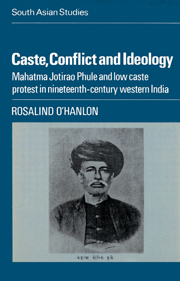 Caste, Conflict and Ideology
Caste, Conflict and Ideology Book contents
- Frontmatter
- Contents
- Acknowledgements
- Notes on translations and area under study, with map
- Part 1 Introduction
- Part 2 Religion and society under early British rule
- Part 3 Jotirao Phule and his circle: the emergence of a distinctive radical voice
- Part 4 The creation of a lower caste identity in history and popular culture, 1869–73
- 7 Ritual status and political conflict in later nineteenth-century Maharashtra
- 8 The Aryan invasions and the origins of caste society
- 9 Warriors and cultivators: the reinterpretation of popular culture
- 10 Maratha history as polemic: low caste ideology and political debate in late nineteenth-century Maharashtra
- Part 5 The lower caste community in contemporary society
- Part 6 Ideology and the non-Brahman movement in the 1880s
- Bibliographic note
- Bibliography
- Glossary
- Index
7 - Ritual status and political conflict in later nineteenth-century Maharashtra
from Part 4 - The creation of a lower caste identity in history and popular culture, 1869–73
Published online by Cambridge University Press: 14 October 2009
- Frontmatter
- Contents
- Acknowledgements
- Notes on translations and area under study, with map
- Part 1 Introduction
- Part 2 Religion and society under early British rule
- Part 3 Jotirao Phule and his circle: the emergence of a distinctive radical voice
- Part 4 The creation of a lower caste identity in history and popular culture, 1869–73
- 7 Ritual status and political conflict in later nineteenth-century Maharashtra
- 8 The Aryan invasions and the origins of caste society
- 9 Warriors and cultivators: the reinterpretation of popular culture
- 10 Maratha history as polemic: low caste ideology and political debate in late nineteenth-century Maharashtra
- Part 5 The lower caste community in contemporary society
- Part 6 Ideology and the non-Brahman movement in the 1880s
- Bibliographic note
- Bibliography
- Glossary
- Index
Summary
New strategies for the attack on Brahman power
Following his retirement from the managing committee of the schools for the lower castes in 1858, Phule devoted himself in the early 1860s to a variety of social reform campaigns. He took part in the first attempts in Pune to liberalise attitudes towards the remarriage of widows. In 1863 he made an even bolder move with the opening of a ‘Home for the prevention of infanticide’. Here, high caste widows who had become pregnant could come and give birth in secret and return quietly to their families, leaving the babies at the home. Posters and handbills advertised the home, which quickly collected about thirty-five infants. The survival rate amongst the children was very poor, however, and Phule's great-nephew Gajananrao reported that most of them died before the age of five. Phule and his wife Savitribai, without children of their own, adopted one of these, a boy named Yashavantrao, the son of a Brahman widow.
Phule supported these efforts by setting up in business. He had inherited a small amount of money from his father's second wife, which he invested in a metalwork shop in Pune. He became the agent for his friend Vasudev Babaji Navarange, who had been to London in 1863 to make contacts for the sale of metal-casting equipment. Phule built up a great trade selling this equipment to factories in Pune. He employed two servants at his shop, which grew to a daily turnover of about Rs 100. This business laid the foundation for the material prosperity which later enabled Phule to devote himself to the lower caste cause.
- Type
- Chapter
- Information
- Caste, Conflict and IdeologyMahatma Jotirao Phule and Low Caste Protest in Nineteenth-Century Western India, pp. 135 - 140Publisher: Cambridge University PressPrint publication year: 1985


